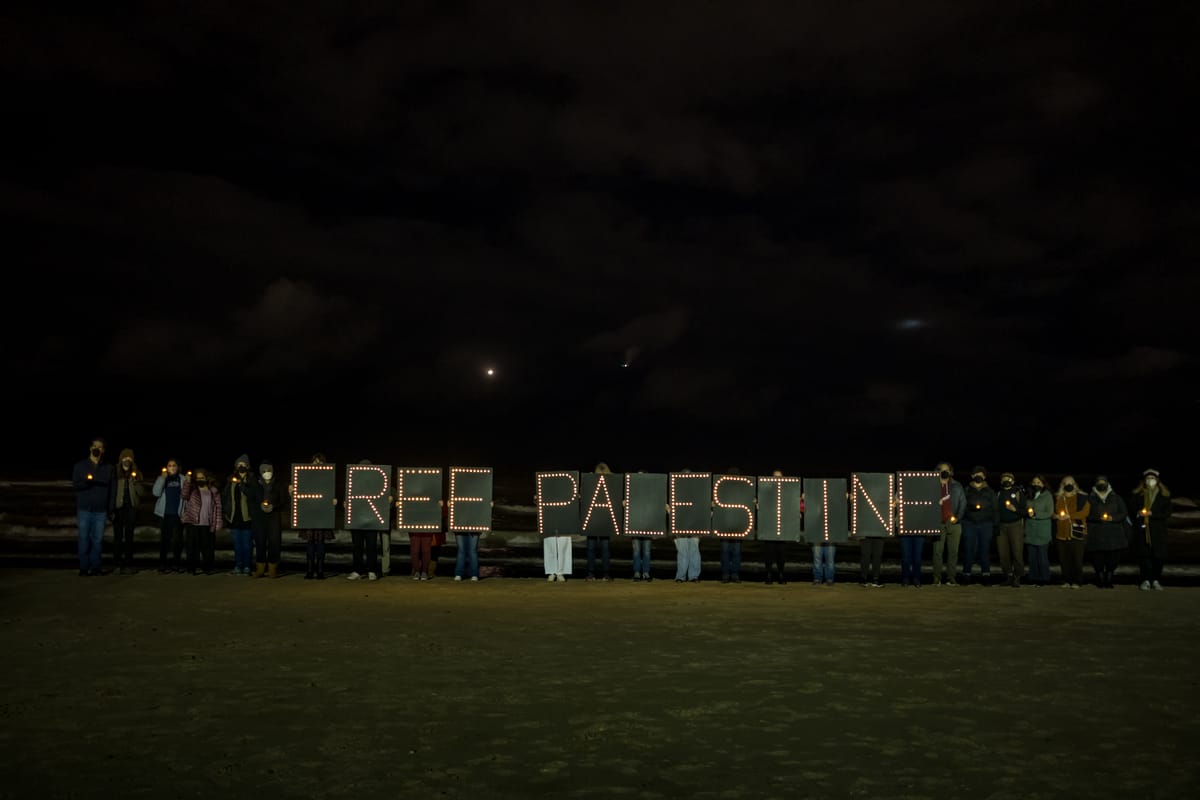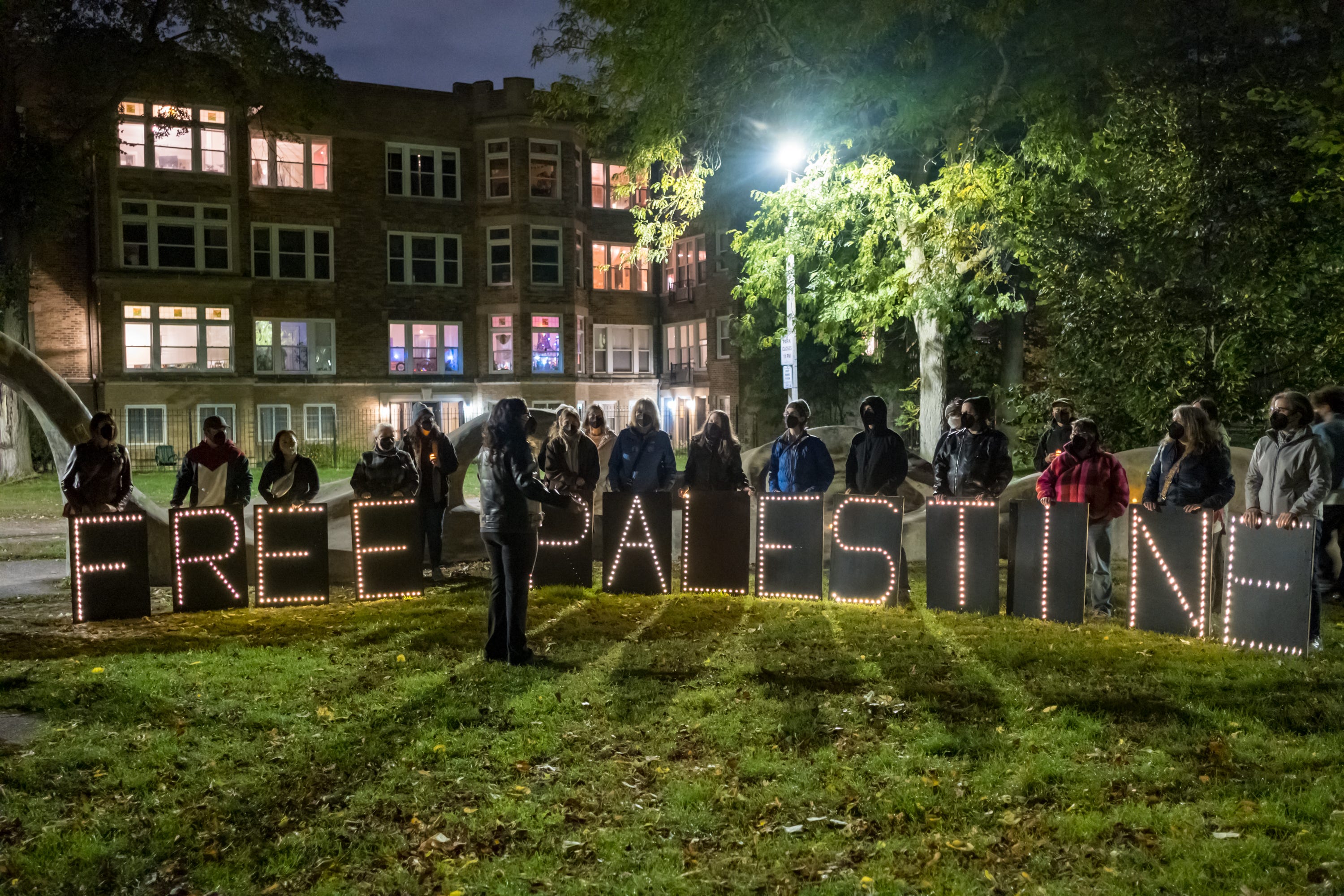A Vigil for Palestine and a Reflection on Grief
"Amid so much repression, every action we take matters."

Photo: Sarah-Ji
On Sunday night, some friends and I gathered at Pratt Beach, in the Rogers Park neighborhood of Chicago, to hold vigil for Palestine. In part, the event was an opportunity to hold space for collective grief, amid so much violence against our Palestinian siblings. Over 2,500 Palestinians have been killed since Israel began its retaliatory attacks after a surprise attack from Hamas took the lives of 1,400 Israelis. In Gaza, hospitals are desperately overcrowded with patients who have been pulled from the rubble of Israeli bombings. While Israel lays siege to Gaza, denying its residents food, electricity, and running water, Palestinians are faced with apocalyptic conditions. Even those who follow directives from the Israel Defense Forces about when to flee, and where to go, have been targeted by Israeli airstrikes. Hospitals and ambulances are running out of fuel.
Last night’s gathering was a small gesture amid so much devastation. It was a gathering that I proposed to some friends, who in turn invited their friends. It has been heartening to see thousands of people take to the streets in the last week. We need large, energetic protests demanding justice for Palestine. But I also think we need smaller moments, where community members can share their grief and uplift their hopes and demands. Our solidarity with Palestine should be ubiquitous and it should come in all shapes and sizes. From mass marches to small group discussions and Palestinian flags hung in our windows, every word and gesture helps create a larger climate in which our solidarity is felt and heard. Amid so much repression, every action we take matters.
I have talked to a number of Palestinians, in recent days, who are afraid to speak publicly, because they may be targeted for violence. In Plainfield Township, Illinois, 6-year-old Wadea Al Fayoume was stabbed by his family’s landlord, who had attacked Wadea’s mother, moments before, while yelling, “Muslims must die!” While Palestinians in Gaza suffer horribly, our Palestinian and Muslim neighbors are also in danger, and now a precious child, who lived a short drive from my home, is gone. In such a moment, those of us who can speak freely cannot waver.
Last night, we gathered to hold vigil a park, and shared a few words, before heading to the water with our electric candles and lighted letters. We reflected on the significance of water, which our Palestinian siblings in Gaza are being deprived of, due to the Israeli siege. We know that water is life and that Gaza is being starved of life by a death-making regime. We honored the leadership and courage of our Palestinian comrades, as well as the commitment of Jewish co-strugglers who refuse to allow their grief to be weaponized for the sake of genocide. We knew we would be standing close together, in order to create our lighted message, so we wore masks to protect one another from COVID-19.
I was grateful for the opportunity to grieve with my community and to create a visual message of solidarity that we could share widely on social media. We held our message and our grief together and uplifted our demand for a free Palestine.

Photo: Sarah-Ji
I was also part of a small group discussion yesterday, as part of a project that Tanuja Jagernauth and I have co-organized called Understory. Understory is a virtual gathering space where prison and police abolitionists engage with ideas that are sacred to us. Our hope is that participants can experience grounding, cohesion, and beauty, while also building coping skills and experiencing a kind of rest and reflection. We discuss short weekly readings (poetry, liberation texts, and science fiction) and talk about where those words can help us go. Each week has a different theme, such as renewal or belonging. This week, we talked about grief, and the conversation was largely focused on Palestine. I appreciated the opportunity to engage in collective vulnerability.
I am someone who often tries to stay busy, so as not to focus on my grief, but when I refuse to engage with my grief, I know that I am shunning a part of myself. Sometimes, it feels as though there is a version of me — the Kelly who is not afraid to cry, or who cannot avoid doing so — who I am leaving locked out in the cold to weep alone. To be whole, I have to invite that part of myself inside, sit with her, and perhaps weep with her. At the very least, I must affirm that part of myself, because their truth is my truth. If I seek to bury or deny my grief, I know from experience that it will spill out in other ways, and prevent me from showing up as my best self. In Rebellious Mourning, Cindy Milstein wrote:
I have traversed “the worst,” sometimes deftly, oftentimes not; sometimes with others, too frequently alone. This pain laid bare much cruelty, some of it systemic, some of it due to socialization. One of the cruelest affronts, though, was the expectation that pain should be hidden away, buried, privatized—a lie manufactured so as to mask and uphold the social order that produces our many, unnecessary losses. When we instead open ourselves to the bonds of loss and pain, we lessen what debilitates us; we reassert life and its beauty. We open ourselves to the bonds of love, expansively understood. Crucially, we have a way, together, to at once grieve more qualitatively and struggle to undo the deadening and deadly structures intent on destroying us.
Cracks appear in the wall.
Those words were the weekly reading we discussed during our Understory gathering yesterday. I talked about the deadening that Milstein described, and how it threatens us and those around us. When we allow ourselves to harden, or allow a sense of inevitability to overwrite our hope and our fury, we are bound to falter, individually and collectively, in catastrophic ways. We must not falter in these times. We know that the genocide in Gaza must end. The bombings, the siege, and Israeli apartheid must be stopped. We must hold our grief together and practice active hope together, naming what we know must be and doing whatever we can, each day, to move toward that horizon.
You can view more photos from the vigil here.




